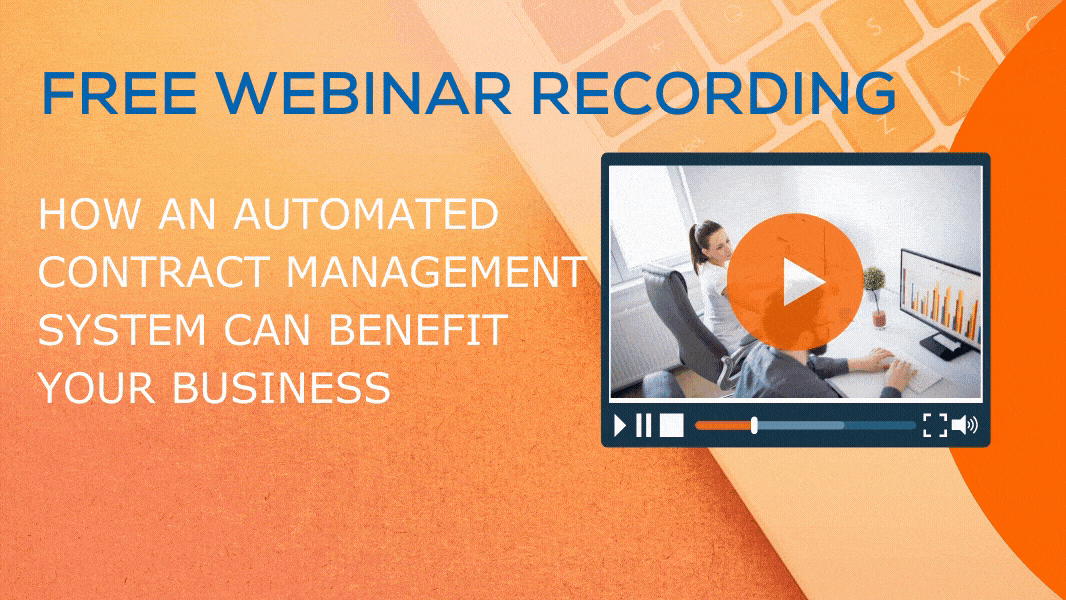
The Complete Guide To Digital Contracts
Digitalizing contracts provide businesses and organization with plenty of advantages. Moreover, it is a necessity in modern business conditions. We are giving you a complete guide to digital contracts through this post.
Content Guide-
What are digital contracts?
A digital contract is an electronic agreement created to outline a business transaction between two or more parties. According to a report by the Global Contract Management Association (IACCM), a whopping 80% of business activities will include contracts in some manner. However, around 20% of contracts (globally) are permanently lost. However, digital contract software provides organized, secure contract storage and efficient contract retrieval.
Take a look at the figures below for some quantitative data points regarding digital contract software for businesses based on recent research by World Commerce & Contracting.
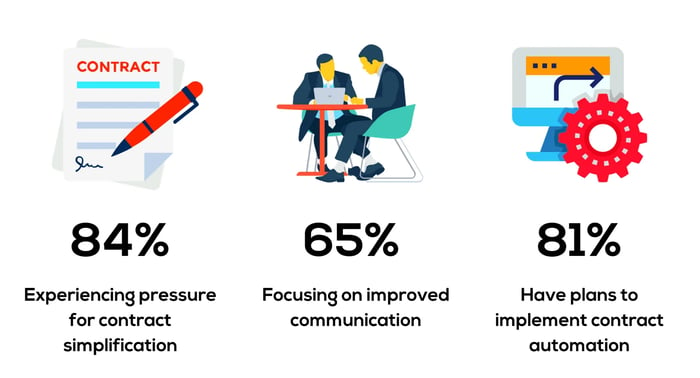
Digital contract software helps companies swiftly respond to organizational shifts and proactively prepare for product launches with on-demand reporting and the ability to customize specified recovery requirements.
The Competitive Business Advantage of Contract Digitization
Contract digitization supports risk mitigation and management with secure contract storage, sharing, and signing. In light of the recent pandemic, new risks have been presented in modern contract management. However, with the support of a digitized contracting approach, contract managers can easily flag and address contract risks. Contract digitization revolutionizes contract management, allowing businesses and organizations of all sizes (from small businesses to enterprise-level organizations) to confidently manage complex contract portfolios and address contract-related demands. Digital contract management is perfectly suited for companies with a remote workforce.
In addition, contract digitization is often paired with artificial intelligence (AI). AI in contract management is used to improve contract search, retrieval, data analysis, and more. One of the most advantageous capabilities of AI in the contract management space is how it can identify specific contracts that increase risk exposure and vulnerability. AI can also flag documents containing risky provisions and support your team by making appropriate changes.
6 Keys to Digital Contract Implementation
#1: Know The Ins and Outs of Your Contract Management System
To properly implement your new contract management system so you can successfully monitor and analyze your contract metadata, take time to learn all of the features included in your solution and ensure your whole team knows how to properly use the system. It’s essential to understand your system’s strengths and weaknesses, as this can support you in developing appropriate KPIs.
#2: Create a Contract Management Software Implementation Team
We recommend that you assign reliable team members to be responsible for overseeing the implementation phase of your new software solution. Administrators and contract managers can lead the implementation, monitoring an efficient and streamlined system implementation. We suggest assigning two to three individuals as administrators over the implementation.
#3: Support Your Team with Sufficient Training
Without question, providing your team with appropriate training on your new automated contract solution is one of the most essential components to a successful implementation phase. This ensures that productivity is maintained once the system is in place and that company protocols and compliance standards are adhered to appropriately.
#4: Schedule Audits and Standardize Security
Schedule routine audits to ensure your contract management procedures maintain compliance with various policies and regulations. Conducting audits regularly can support your team in flagging risks and taking preventative action before they become large-scale issues. We suggest standardizing security rules via permissions-based access controls to ensure that only authorized employees have access to sensitive contract data.
#5: Monitor Performance
Transitioning from traditional paper-based contract management to a digital approach will result in significant performance improvements in workplace productivity, efficiency, and ROI. Proactive, intuitive contract data dashboards provide users with on-demand insights into contract performance and their status within the lifecycle.
#6: Consider Your Company’s Unique Needs and Goals
Digital contract software is built to increase efficiency in the modern contract lifecycle. In addition, these software solutions can often be customized to your unique branding and business objectives. It’s necessary to adopt a solution that is able to adapt and grow with your organization’s needs and the changing demands placed upon it.
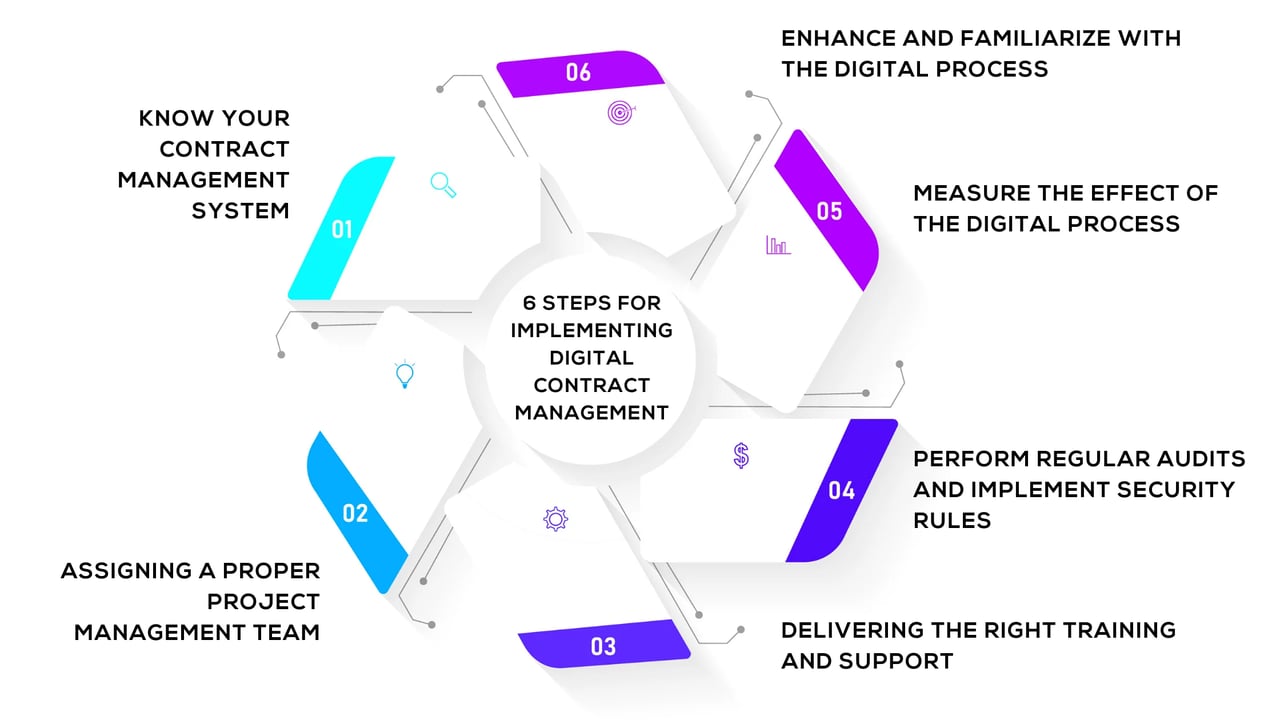
12 Reasons Why You Should Transition to Digital Contract Software
1. Saves Money
The time spent drafting, printing, and sending physical contracts to stakeholders and clients causes unnecessary delays. Remember, time is money! The elimination of paper from your contract management process is also cost-effective. Remove paper-based contract processes and the costs that come along with them. Now, you won’t have to spend money on paper, printing ink, shipping costs, scanners, printers, printer maintenance, and other things. For more on cutting costs, click here.
2. Remote Accessibility
With remote access to your contracts and associated data in a cloud-secure contract repository, your authorized employees and stakeholders can easily obtain exactly what they need, self-service on contracts, and keep the workflow propelling in forward motion no matter where they are located geographically.
3. Automation
Flexible, customizable contract workflows increase the standardization and reliability of your contract management procedures. With automation, you eliminate risks, cut turnaround times, and improve compliance management.
In addition, the many advantages of digital contract software far outweigh any of the positives of a manual, paper-based contract approach. The graphic below expresses exactly why.
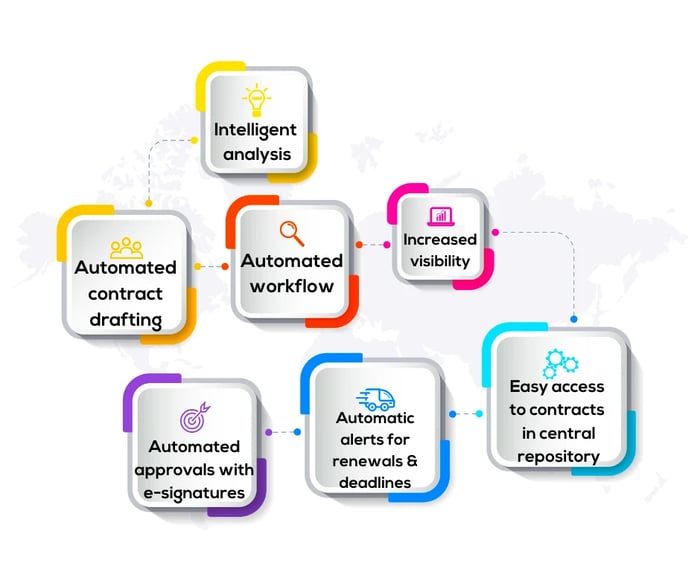
4. Improve Adherence to Compliance Regulations
Digital contract software can support you in maintaining adherence to industry standards, contract laws, and various compliance requirements. You’ll confidently conduct contract management processes with a secure solution that protects client information while allowing contractual parties to efficiently sign and execute legally binding agreements. These solutions are incredible because they make it remarkably easy to track risky terms and risky activities (i.e., questionable procurement procedures, etc.).
Maintaining compliance supports your organization by allowing only authorized users to access and edit contracts – providing you with complete contract control. This can result in the following:
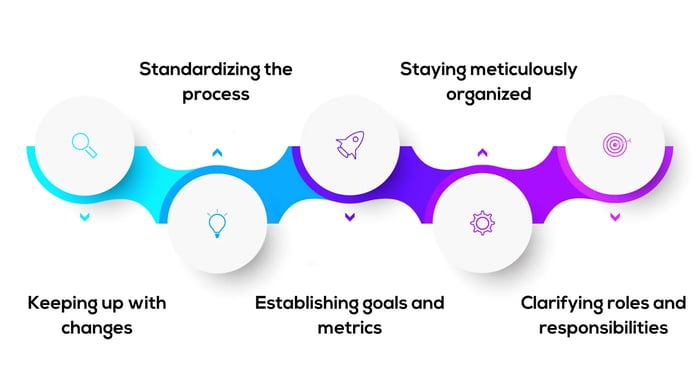
5. Optimized Customer Experience
Digital contract software offers customers, stakeholders, and vendors the ability to securely sign contracts in seconds on their digital device (typically with auto-population of fields) without the need to wait for a physical copy. Customers often prefer digital contracts due to their speed, security, and efficiency. Digital signatures are repeatable, so in many instances, users simply click a button to populate the signing field with their saved signature.
6. Streamlined Performance Analysis
Digital contract software makes it easy to assess vendor performance with performance scorecards and data readily available at all times so you can create and share custom reports. With your performance evaluations, your system rewards your top suppliers which directly improves your business partnership for the long term.
7. Improved Collaboration
With the centralization of contract data and the efficiency of the contract intake and request phase, you’ll receive all relevant client or vendor information at the very beginning of the contract lifecycle. This means that later in the contract lifecycle during approvals, reviews, and negotiations communication is streamlined with in-document commenting, “@” mentioning, automation, and email integrations. All of these factors combined allow for productive, collaboration, and secure contract lifecycle management.
8. Optimized Performance Monitoring
Take your contract monitoring to the next level with intuitive digital contract software. Dashboards allow you to easily oversee the status and performance of your contracts in all phases of the contract lifecycle.
9. Use Preapproved Contract Templates
Build accurate contracts in minutes with compliant contract templates that are preapproved by your legal department. This means you can reuse your standardized templates for common contract types and leverage electronic signatures for rapid signing and execution for high volumes of contracts. When consistently editing your agreements, you can simply change one field in your template as needed. Digital contract software autosaves your templates for you to work on them at later times.
10. Save Time
Reduce bottlenecks and delays by digitizing your contracts. Manual contract management takes more time for clients to receive, consider, and physically sign contracts. Businesses with higher volumes of contracts and more employees may have longer turnaround times, which can potentially harm the ability to seize contract opportunities as they come. Instead of having deals stall out because of avoidable delays, you can allow your potential clients and vendors to retrieve, read, and sign contracts on their own devices within seconds due to the support of a digital, cloud-based contract system. You’ll also save time during contract drafting thanks to contract templates and auto-population of metadata, meaning you can immediately update files and send them off to prospective clients without spending time scheduling a meeting.
11. Integrate, Integrate, Integrate
With electronic signatures, CRM, and other digital business solutions, you can integrate your contract management system for robust, collaborative contract management. Some of our personal favorites include the Microsoft Office Suite, SharePoint, DocuSign, Adobe Sign, and Sertifi eSignature.
12. Effective Risk Management
Digital contract software improves risk management strategies by decreasing human errors and the likelihood of tampering. Discrepancies in data entry, failure to review contract content, and noncompliance all result in avoidable and expensive repercussions. By standardizing your contract management procedures with digital contract software, you will ensure that reviews are thoroughly completed and that contracts aren’t approved with inaccuracies and improper terms.
In traditional, paper-based contract management, contracts are unfortunately commonly manipulated post-signature. Digitizing your contracts can serve as a preventative measure against this phenomenon, reducing the potential for legal disputes.
Digital contracts typically result in significantly fewer errors than that paper-based, traditional alternatives. This is because digital contracts provide contract authors with complete control over the history of the contract, as well as the ability for the contract author and the recipient to read and change terms before signing. Digitized contracts are created for effective collaboration, meaning each party can communicate and determine fair and mutually beneficial terms.
A Note on Automation
Today, large organizations use digital contract software to automate their internal data, communication, and collaboration for streamlined contract management and increased opportunities to close deals. Automation is a phenomenal risk-prevention tool. Automating your contract management can help protect your brand reputation and safeguard against contract breaches.
3 Best Practices For Using Digital Contract Software
1. Prioritize Contract Accessibility
Give your team the best chance for success by making contract access pain-free. How? By storing your contracts in a secure, cloud-based digital repository. Configure role and permissions-based access controls to ensure that your contracts only land in the right hands.
2. Conduct Regular Performance Analysis
Retrieve exact documents for analysis in seconds with advanced keyword-based searches and by using customizable, savable filters. With trained AI built into your contract management system, the AI can analyze document content and provide search results according to select clauses, key dates, and other pieces of metadata. From here, you can generate custom reports based on selected contract metadata.
3. Automate Contract Renewals
At the point of contract expiry, you might be required to renegotiation contract provisions. To efficiently manage all of the key dates and contract renewals in your portfolio, we suggest automating your contract renewals and employing e-signatures to streamline this phase of the contract lifecycle.
10 Key Features of the Best Digital Contract Software
1. A Cloud-Secure Digital Contract Repository
This feature offers centralized, secure contract storage, search, and ongoing management of all of your organization’s contracts. Rather than rely on outdated, manual contract methods and physical storage in filing cabinets, shared drives, desktops, and other disjointed methods that are highly susceptible to risk exposure and tampering, you can confidently keep your contracts within reach of all of your authorized employees in your repository. A SharePoint-based contract repository provides visibility and transparency over all of your contract activities.
2. Automated Reminders for Contract Expiries and Auto Renewals
Automated reminders increase awareness within your organization of key dates, deadlines, and time-sensitive contract management responsibilities. This means that you can configure custom reminders to be triggered and sent to select stakeholders and employees regarding critical actions and tasks to maintain a proactive approach toward your contracts and the deadlines associated with them. In this manner, you ensure that nothing slips through the cracks – whether it’s an unwanted autorenewal, expiring contract, milestone, obligation, etc.
Creating custom reminder flows is simple with your digital contract software, and these flows keep the right people in the loop. With a simple notification, you’ll safeguard your organization from preventative financial and reputational consequences resulting from missed deadlines, milestones, and obligations. Task management becomes far more efficient, and managing your key dates becomes streamlined and centralized, meaning you’ll never need to use a sticky note or Gmail to keep tabs on your due dates.
3. Contract Templates and Clause Libraries
Legally compliant and preapproved contract templates and clauses help to prevent risk, increase compliance, and improve the speed of your contract drafting and negotiation phases. You’ll create accurate, professional agreements and establish consistency in your contractual language.
For the most contract security and risk prevention possible, a contract template library and a clause library are perfect – especially when compliance is concerned. Template libraries include preapproved templates based on the type of contract, while clause libraries based on clause types (all preapproved by your legal department) are searchable and easy to insert into fields within your contracts.
4. Version Control
Digital contract software includes version control capabilities to ensure that your teams only work on the most recently updated contract drafts. With version control, you gain insights on the exact dates and times that changes were made to each document, as well as learn who made what changes. Version control supports your risk mitigation efforts by offering the ability to monitor all contract activities with recorded times, which can help prevent accidental duplication or deletion of contract data. Redlining, approvals, and contract reviews become far more efficient, cohesive, and accurate with the assistance of version control.
5. Flexible, Customizable Workflow Automation
Build automated contract workflows to standardize each phase of the contract lifecycle, predetermining the exact route that your contract will travel. Automated workflows allow users to build out a series of steps for each contract, notifying the correct stakeholders along the way of which actions to take on the contract before it is sent off to the next person for the following step. Workflows can be bulk applied to groups of contracts, groups of clauses, or single documents. For optimized speed and collaboration, leverage automation to streamline reviews, drafting, signing, negotiations, and much more.
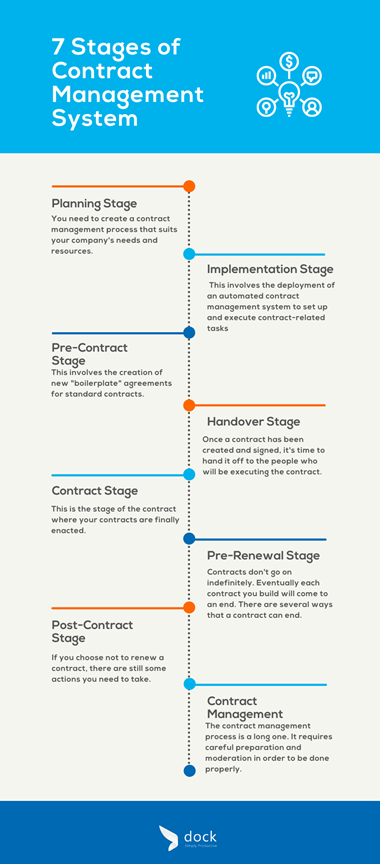
6. Electronic Signature Integrations
Electronic signatures are used in nearly every organization today due to their security and speed. Digital signatures improve the client and vendor experience with a smooth and efficient signing and approval process, where signers can sign contracts on their digital devices at any time, any place – no need for paper contracts and snail-mailing. Here at Dock, our solution is integrated with Sertifi, DocuSign, and Adobe Sign.
7. Advanced Security Settings
Contract managers and administrators can configure their systems with permissions-based and role-based accessibility features to ensure that only authorized users have access to sensitive contract data. However, there are several security settings and features to keep your eyes out for when purchasing a contract solution. The top security and compliance features to look for include the following:
- Permissions and Role-based Access Controls
- Audit Trails
- Single Sign-On (SSO)
- Multi-Factor Authentication
- Passwords
- Licenses
- Electronic Signatures
- Vulnerability Testing
- Cloud Security
8. Proactive Data Dashboards
Analyze current contract data, then build and share custom reports with stakeholders and upper management within minutes. Staying in the loop of every contract detail is made possible with insightful dashboards displaying on-demand contract metadata and performance markers. This means you can measure the progress and performance of each contract and gain an understanding of how productive each lifecycle is. Dashboards are a great resource for learning where you can optimize your current contracting strategies and where risk is present so you can take proactive measures to mitigate risks.
9. Efficient Contract Intake Phase
The contract intake and request phase largely determines the remainder of the contract lifecycle. Digital contract software offers the ability to create standard, customized intake forms to streamline client information collection at the beginning. With these forms, you can set off automated workflows to start your contracts off on the right foot. In addition, these forms help mitigate bottlenecks and discrepancies in manual data entry.
10. Audit Trails
Analyze data to assess compliance and increase organizational awareness of compliance regulations, allowing you to make data-driven and compliance-oriented business decisions. In addition, audit trails boost the transparency of your contract management procedures, where you can easily review the history of each contract.
What is a Contract Repository?
Outdated Manual Contract Storage vs. Contract Repositories
Outdated manual contract storage by way of shared drives, filing cabinets, desktops, and other disjointed storage methods only increases risk, the potential for tampering, and the likelihood of contracts going rogue. In addition, it can take up to weeks (or even months) to find a missing contract. So why use an outdated storage method when there’s an easier way with filters and advanced, text-based search features? Digital repositories allow you to find exact documents in seconds at the times you need them most – such as negotiations.
Contract Repositories Defined
Digital contract repositories (often referred to as “centralized repositories” or “contract repositories”) are electronic storage systems built for the simplified management, organization, rapid retrieval, and secure storage of your company’s contracts. Within your repository, authorized users can easily sort, retrieve, archive, tag, and store contracts and other relevant files in a cloud-secure, centralized location. In your repository, you can use custom, savable filters, and text-based searches to find exact contracts, clauses, and metadata.
If you currently experience difficulty in managing your contract portfolio and the key dates associated with each agreement, then adopting contract management software with an intuitive digital contract repository is a great place to start. This is especially pertinent for organizations with contract portfolios growing in both complexity and volume. A digital repository supports you in keeping up with the growing demands placed on your business.
6 Reasons To Say Goodbye to Manual Contract Storage
Kiss disorganization goodbye and make manual, paper-based contract storage a thing of the past. Here are six reasons to introduce a digital repository and let go of outdated storage.
1. Decreased Accessibility of Contract Data
Email chains and filing cabinets are no place to store sensitive information – especially the information contained in legally binding agreements like business or employment contracts. By storing your contracts in risky, inaccessible places, you drive up bottlenecks and make it harder to find your contracts – causing completely preventable delays.
2. Poor Security
Keep contracts completely secure in your digital repository. Manual, physical contract storage is susceptible to data breaches and leaks. Outdated storage methods also do not offer the ability to encrypt your contract data at rest and in transit, or to configure user permissions-based access features, which a digital repository can provide.
3. Easy to Forget Deadlines
Never miss a milestone, auto-renewal, contract expiry, or other time-sensitive contract activity ever again with the support of customized, automated notifications to help remind your team of upcoming priorities.
4. Inability to Control Versions
Manual contract storage can increase confusion regarding which document draft is the most recently updated one. Eliminate confusion with version control provided by a digital solution. This means you won’t have to worry about document duplication or team members working on the wrong draft. Increase visibility and decreases confusion with advanced digital version controls.
5. Lacking KPI Tracking
Track your KPIs like a pro with digital contract software. Manual contract methods do not provide on-demand access to data, so tracking performance KPIs becomes time-consuming.
6. Costly Compliance Results
Manual contract storage drives up costs due to the financial penalties that come with non-compliant contracts and failed adherence to compliance regulations.
9 Reasons to Say Hello to a Digital Contract Repository
1. Storage & Accessibility
Give your whole team a single source of truth when it comes to finding contracts and associated data. Now, your authorized users and stakeholders can retrieve contracts hassle-free, meaning they can find accurate data pertaining to their business partnerships. Furthermore, your contract management solution and repository are equipped to integrate with various other electronic business solutions (i.e., CRMs, and e-signatures). Maximize contract security with cloud security, permissions, role-based access controls, encryption, Single Sign-On (SSO), custom authentication configurations, and many other key security settings.
Contract repositories increase the speed of contract access thanks to custom filters and text-based searches. You can sort through thousands of documents and metadata in seconds, retrieving exact data on demand. Simplify contract searches, data analysis, and report generation with the help of an intelligent digital repository. Here, you can select exact data points to determine updated KPIs and monitor contract performance with your proactive contract data dashboard.
2. Close Deals Faster
Extract more business revenue in the same amount of time or less by closing more deals at faster rates. Simplifying the agreement process of your contracts can result in a higher rate of contracts completed and more deals closed. An optimized contract lifecycle management process that automates and standardizes agreements can cut down on manual errors and bottlenecks found within this phase.
The digital marketplace has transformed and evolved into what it is today, and your contract procedures must adapt and adjust to evolving with it, particularly by increasing the speed and productivity of each phase of the contract lifecycle. Eliminating delays and minimizing turnaround times can help you drive more value out of your business partnerships and land better deals.
3. Increase Employee Productivity
Digital contract management software allows users to save employees the time and headaches involved in traditional manual contract management processes. Drive business and contract value with digital contract software for robust improvements in pre- and post-reward contract activities by leveraging reporting and data analytics tools. We strongly encourage adopting a system that takes care of the entire lifecycle of your contracts so that you can automate and standardize the whole lifespan of your contracts.
The advantages of digital contracts go far beyond simply expediting the process. Digital contracts empower users to synthesize key contract metadata effortlessly and glean intelligent insights so they can make the best business decisions and develop improved agreements moving forward. The issues of human errors and discrepancies in the manual entry of data for contracts are substantially reduced with the assistance of a software platform. Gone are the days of copying and pasting client information into your contracts. Instead, a contract management system can pull client data from secure records and auto-populate it into your contract templates within seconds.
4. Cut Costs
Digital contracting is far more cost-efficient than traditional, paper-based contracting. From signing to storage, and ongoing management, a centralized, secure, digital contract approach is the way to go. According to your organization’s pre-existing systems, you can seamlessly integrate your contract lifecycle management system with other online business solutions and applications to cut costs, save time, mitigate risk, and boost compliance. Digital contract software provides an easier way to complete and conduct contract reviews, one of the most time-consumptive contract-related activities. If your business works with a high volume of complex contracts, then adopting a digital solution is one of the most sensible decisions you could make.
Now we’re going to take a look at some of the biggest infrastructure improvements that support your all-in-one contract lifecycle management and contract workflows. It’s important to note that an efficient and effective contract management infrastructure can lead to reductions in noncompliance and organizational risks due to its ability to monitor and track contracts with precision.
5. Leverage AI and Advanced Capabilities
Artificial intelligence (AI) has changed modern business and contracting strategies. Many contract management solutions have included AI capabilities in their systems to offer robust data analysis of contracts, particularly during the negotiation phase to ensure that accurate, compliant contract terminology is included that aligns with company needs and objectives. In addition, you can utilize text-based search and customizable filters to rapidly locate exact terms, clauses, obligations, key dates, milestones, pricing structures, and contracts in seconds rather than parsing through shared drives and filing cabinets.
Digital contract software gives users several features to choose from to support the standardization of contract language, where comparing past and present contracts to ensure that terminology is current and compliant is remarkably easy. You won’t have to fret about letting value slip away from your company’s contracts – instead, you’ll have everything within grasp to drive contract value prior to signing and after signing.
6. Improve Contract Compliance
It is vital to appropriately adhere to all compliance policies and regulations, and these will vary from company to company, industry to industry. It can be expensive to ensure compliance with your organization’s contract management procedures. However, the financial repercussions resulting from non-compliant contracts far outweigh the expenses of implementing software that ensures compliance. Digital contract software inclusive of audit trails and employee training guides can help prevent noncompliance while keeping your contract data secure.
Another way to increase the rate of compliance in your company’s contracts is by leveraging preapproved contract templates and clause libraries so that only the most up-to-date and legally approved contract terminology and legalese are included in your business agreements.
7. Streamline Business Transactions
Creating a smooth experience for closing deals and providing a pain-free business experience is central to improving your business partnerships. Who wants to work with a company where making an agreement is always extremely time-consuming? You’ll be hard-pressed to find a business partner that wants to work with you if it takes weeks on end to come to an agreement. This also means a reduction in client satisfaction, and word of mouth travels fast – so keep your business partners satisfied with agile and precise contract management!
Eliminate the painstaking process of printing, faxing, snail-mailing, scanning, signing, and storing paper contract documents. Cut costs, save time, boost productivity, minimize turnaround times, and provide the best possible contract experience to both your clients and employees with digital contract software.
8. Track KPIs
Finally, evaluating supplier performance can be easily done with an advanced digitalized contract management system. For every organization deciding on whether to continue with a supplier is a matter that is looked forward to. And for that, a standard contract protocol is upheld in all organizations. The real advantage of performance evaluation is that it rewards the best supplier and helps keep continuing a sturdy and long-term profitable affiliation with them.
Enforcing a digitalized contract management culture is, therefore, crucial to set forth a strong base in closing business transactions profitably and flawlessly in every organization. Achieve KPIs with the assistance of a contract repository. Custom reporting, instant data and contract access, and intuitive dashboards empower you to make data-based choices in your contract strategy. Seamlessly gain insights on your contracting activities with audit trails, providing a full overview of the contract activities with time and date stamps. In this manner, contract histories are easily accessible.
9. Improve Collaboration
Contract management should be a collaborative process allowing for the seamless flow of communication and ideas between departments, business partners, and stakeholders. In this manner, a digital contract repository can simplify the contract lifecycle and ease the reviewing phase with in-document redlining, commenting, and e-signatures.
Learn more about our Dock 365 Contract Management System here.
Learn more about Contract Lifecycle Management (CLM) Software here.

Written by Linu Mohan
Linu Mohan is a Content Developer who loves to create content with deep business insights. She provides businesses with solid ideas that can put them in a good position even in tough times. She believes in business strategies backed by intelligent technology solutions.
Reviewed by Naveen K P
Book a Live demo
Schedule a live demo of Dock 365's Contract Management Software instantly.



